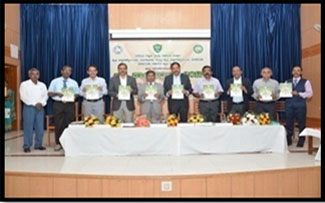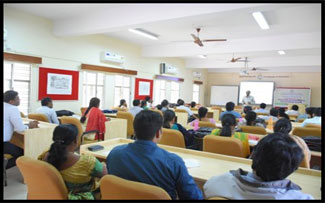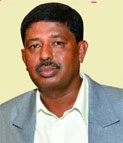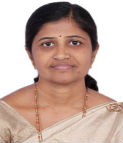Staff Training Unit
The Staff Training Unit (STU) was started in 1974 with a view to promote professional competency among the staff of various organizations within and outside the State of Karnataka. The STU is organizing institutional training courses; field oriented training programmes for various personnel of private, government and quasi-government organizations.
Mandate
- To identify the training needs
- To develop appropriate training modules
- To arrange the training programmes
- To co-ordinate between sponsoring agency and the University.
- To monitor the effectiveness and evaluate training programmes.
- To serve the staff of developmental / line departments, NGO’s, Banks and other organizations
ATMA (Agriculture Technology Management Agency)
ATMA is a system of Agricultural Technology Management to improve the functioning of extension programmes in agriculture and allied fields to converge at the grassroots level / operational level to bring out efficiency and effectiveness in extension and development process.
SAMETI (State Agriculture Management Extension Training Institute)
Mandate
- To organize the Human Resource Development activities for the stakeholders of ATMA
- To provide capacity building to the extension functionaries
- To develop management tools for improving the effectiveness of agricultural extension
- To organize need based training programmes for extension functionaries
- To develop modules on Management, Communication, Participatory Methodologies etc, based on feedback from training programmes.
Agri-Clinics and Agri-Business Centres (ACABC) scheme Training Cell
The Agri-Clinics and Agri-Business Centres (ACABC) scheme at the Directorate of Extension was started during the year 2002 with the financial support from the National Bank for Agriculture and Rural Development (NABARD), to provide training to the Graduates of state agriculture universities to set up their own Agri-Clinics and Agri-Business Centres. MANAGE, Hyderabad is coordinating in organizing the training programmes.
Mandate
- To organize training programmes for graduates of state Agricultural Universities of Karnataka.
- To support the trainees in preparation of Detailed Project Reports to start agri entrepreneurship.
- To facilitate the trained graduates to establish Agri-ventures.
Diploma in Agricultural Extension Services for Input Dealers (DAESI)
Background
In India, there are about 2.82 lakh practicing agri-input dealers, who are the prime source of farm information to the farming community. However, most of these input dealers do not have formal agricultural education. If these input dealers can be shaped as para-extension professionals by providing requisite knowledge, they can professionalize extension services and contribute to bring a paradigm shift in Indian Agriculture. It is in this context, the National Institute of Agriculture Extension Management (MANAGE) had designed a one-year diploma course titled ‘Diploma in Agricultural Extension Services for Input Dealers (DAESI)’, which imparts relevant and location-specific agricultural education to equip these input dealers with sufficient knowledge to transform them into para-extension professionals so as to enable them to address the day-to-day problems being faced by the farmers at field level.
Mission
To transform practicing input dealers into para-extension professionals thereby strengthening the agricultural extension system so as to enable these input dealers to serve the farmers better.
Objectives
- Orientation of input dealers on location-specific crop production technologies of broad-based agriculture with reference to field problems
- Building the capacity of input dealers in efficient handling of Inputs
- To impart knowledge about the laws governing regulation of agricultural Inputs
- To make input dealers an effective source of farm information at the village level (one stop shop) for the farmers
Methodology
DAESI has been designed in such a way that the input dealer can pursue the program without adversely affecting his day-to-day business. The program is spread over a period of 48 weeks, with 40 classroom sessions and 8 Field visits to various institutions and farmers’ fields. The classroom sessions and field visits are conducted on Sundays or local market holidays. The field visits are intended to acquaint the input dealers with location-specific field problems and expose them to relevant technologies. They are trained to identify pests, diseases and nutritional disorders. Study material in local language is provided and multi-media instructional devices are used in the classrooms.
All the stakeholders involved in DAESI program i.e. the input dealers, resource persons, facilitators, institutions capable of delivering the program viz. ATMAs, KVKs, NGOs, Agrl. Colleges etc. are located at district level. The cropping pattern, the package of practices and the field visits are location-specific. Hence, ‘decentralized approach’ is adopted to cover 300 batches per year. Each batch comprises of 40 input dealers. The program is implemented by MANAGE through SAMETIs under the overall guidance and supervision of respective state departments of agriculture. MANAGE.
 |
 |

Dr. C.V. Venkatesh Murthy
Associate Professor(Agril. Engineering)
This email address is being protected from spambots. You need JavaScript enabled to view it.
+91-98456 42122

Dr. R. Narayana Reddy
Assistant Professor (Sericulture)This email address is being protected from spambots. You need JavaScript enabled to view it.
+91-99014 88773








